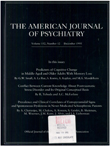Psychosocial impact of HIV-related caregiving on health providers: a review and recommendations for the role of psychiatry
Abstract
OBJECTIVE: The author considers current knowledge about the stresses of HIV-related care and assesses available evidence for the presence of major occupational, physical, and psychiatric morbidity in health care providers involved in intensive HIV-related caregiving. METHOD: The review is based on anecdotal reports of AIDS-care-related psychosocial distress and the literature concerning caregivers' attitudes toward people with HIV illness and HIV-related caregiving, the psychosocial impact of HIV work, and stress related to the ethical and philosophical challenges facing HIV caregivers. RESULTS: Few of the current publications concerning HIV caregiver stress come from the psychiatric literature. Psychiatry appears to lack a strong clinical, educational, research, or policy presence regarding psychosocial stress in HIV care providers. The numerous studies in the nursing, medical, public health, and health education literature do not include any controlled investigations documenting the incidence and prevalence of physical, psychological, occupational, or interpersonal symptoms or disorders in health care professionals who devote a substantial amount of their clinical activities to patients with HIV illness. CONCLUSIONS: Major HIV-related stress in conjunction with other psychiatric morbidity, such as mood disorders, anxiety disorders, substance abuse, and relationship and occupational problems, seems likely in susceptible caregivers. Decisions about the structure and form of delivery of HIV- related care and programs for caregivers must be based on more carefully controlled psychiatric observations of occupational, physical, psychological, and social adaptation to HIV-related work. The author suggests several areas in which psychiatric clinicians, educators, researchers, and policy experts can make major contributions.
Access content
To read the fulltext, please use one of the options below to sign in or purchase access.- Personal login
- Institutional Login
- Sign in via OpenAthens
- Register for access
-
Please login/register if you wish to pair your device and check access availability.
Not a subscriber?
PsychiatryOnline subscription options offer access to the DSM-5 library, books, journals, CME, and patient resources. This all-in-one virtual library provides psychiatrists and mental health professionals with key resources for diagnosis, treatment, research, and professional development.
Need more help? PsychiatryOnline Customer Service may be reached by emailing [email protected] or by calling 800-368-5777 (in the U.S.) or 703-907-7322 (outside the U.S.).



